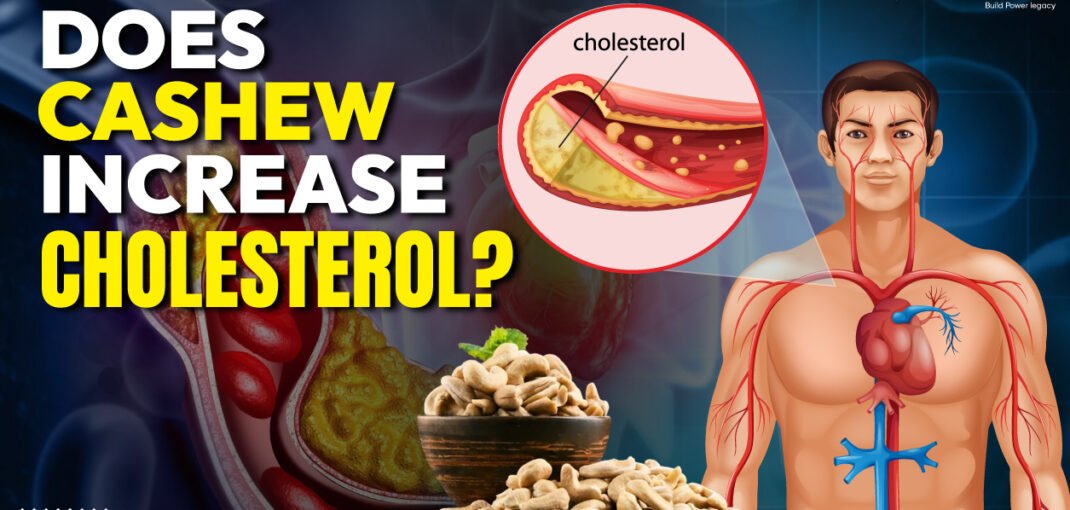Cashews are a popular and tasty nut that many people enjoy as a snack or in various dishes. But, like with many foods, you might wonder if eating cashews affects your cholesterol levels. In this blog, we’ll explore whether cashews have any impact on cholesterol and what you need to know about incorporating them into your diet.
What Are Cashews?
Cashews are nuts that come from the cashew tree, which is native to Brazil but now grown in many tropical areas around the world. They are known for their creamy texture and slightly sweet flavor. Cashews are often eaten raw, roasted, or used in cooking to add a rich taste to dishes. They are also used to make cashew butter, cashew cheese, and even cashew milk.
What Is Cholesterol?
Before we dive into how cashews might affect cholesterol, let’s briefly understand what cholesterol is. Cholesterol is a type of fat found in your blood. Your body needs some cholesterol to build healthy cells, but having too much can lead to health problems. Cholesterol travels through your bloodstream in two main forms:
- Low-Density Lipoprotein (LDL): Often called “bad” cholesterol, high levels of LDL can lead to the buildup of plaque in your arteries, which can increase the risk of heart disease.
- High-Density Lipoprotein (HDL): Known as “good” cholesterol, HDL helps remove LDL cholesterol from the bloodstream, reducing the risk of heart disease.
Do Cashews Affect Cholesterol Levels?
Many people are concerned about whether eating nuts like cashews will affect their cholesterol levels. Here’s what research and nutrition experts say:
- Healthy Fats: Cashews are rich in healthy fats. These include monounsaturated and polyunsaturated fats, which are known to be good for heart health. These types of fats can help lower LDL cholesterol levels and increase HDL cholesterol levels. This means that eating cashews might help improve your cholesterol profile, rather than harm it.
- Nutrient-Rich: Cashews contain essential nutrients such as magnesium, copper, and vitamin K. These nutrients can contribute to overall heart health. Magnesium, in particular, plays a role in regulating blood pressure and reducing the risk of heart disease.
- Antioxidants: Cashews are also a source of antioxidants, which help protect your cells from damage caused by free radicals. This protection can be beneficial for your heart and overall health.
- Moderation Is Key: While cashews can be good for your cholesterol levels, it’s important to eat them in moderation. Like all nuts, cashews are high in calories. Eating too many can lead to weight gain, which can negatively affect cholesterol levels. A small handful of cashews a day is usually a healthy amount.
- Balance with Other Foods: It’s also important to have a balanced diet. Eating cashews alone won’t fix high cholesterol if your overall diet isn’t healthy. Make sure you also eat plenty of fruits, vegetables, whole grains, and lean proteins.
How to Include Cashews in Your Diet
Here are some simple and delicious ways to enjoy cashews while keeping your cholesterol levels in check:
- Snack on Them: A small handful of cashews makes for a satisfying and nutritious snack. Try to choose unsalted varieties to keep your sodium intake low.
- Add to Salads: Toss cashews into your salads for added crunch and flavor. They go well with a variety of vegetables and dressings.
- Use in Cooking: Cashews can be used in cooking to add creaminess to dishes. For example, you can blend them into a sauce or use them as a base for dairy-free cheese.
- Cashew Butter: Spread cashew butter on whole-grain toast or use it in smoothies. It’s a great alternative to peanut butter and adds a different flavor.
- Cashew Milk: If you’re looking for a dairy-free milk option, try cashew milk. It’s creamy and can be used in coffee, cereal, or baking.
Things to Watch Out For
Even though cashews have health benefits, there are a few things to keep in mind:
- Allergies: Some people are allergic to nuts, including cashews. If you have a nut allergy, you should avoid cashews and other nuts.
- Salt and Sugar: Be cautious with flavored or salted cashews. Excessive salt and sugar can counteract the health benefits of the nuts.
- Portion Size: Remember that nuts are calorie-dense. Keep your portions moderate to avoid consuming too many calories.
Conclusion
Cashews are a nutritious and tasty nut that can be part of a healthy diet. They contain healthy fats, essential nutrients, and antioxidants that can support good cholesterol levels and overall heart health. However, it’s important to eat them in moderation and as part of a balanced diet. So, go ahead and enjoy cashews in your meals and snacks, but remember to keep an eye on portion sizes and balance them with other healthy foods.
If you have concerns about your cholesterol levels or diet, it’s always a good idea to talk to a healthcare provider or a registered dietitian. They can offer personalized advice and help you create a plan that’s right for your health needs.






